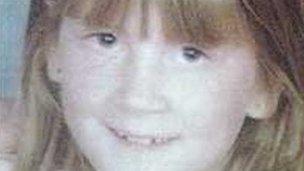Hyponatraemia inquiry: Meeting with family was disaster
- Published

Nine-year-old Raychel Ferguson died in hospital in 2001
A meeting between the parents of a child who died in hospital and the chief executive of a health trust was "a disaster," an inquiry has heard.
Stella Burnside, of the former Altnagelvin health and social services trust, said she was sorry the meeting was "not adequate to meet the needs of a grieving family".
The inquiry is examining the death from hyponatraemia of Raychel Ferguson.
Raychel died in Altnagelvin hospital in Londonderry in 2001.
Hyponatraemia is the term for a low level of sodium in the bloodstream, which causes the brain cells to swell with too much water.
The inquiry is also examining the hyponatraemia-related deaths of three children in hospitals in Northern Ireland, the events following the death of another and a number of issues around the death of a fifth child.
The issues of fluid management and hyponatraemia are central to the cases of each of these children.
'Lethal dose'
Raychel Ferguson died a day after a routine appendix operation.
She had been administered a lethal dose of intravenous fluid.
Her family met with the trust's chief executive, Stella Burnside, in September of that year.
The inquiry's lawyer put it to her that the meeting had been "a disaster".
Mrs Burnside replied: "I am profoundly sorry that that meeting, or my abilities in that meeting, were not adequate to meet the needs of a grieving family."
She said the meeting had been "an honest attempt to be honest and to be understanding and to offer our apology that this child had died, and this child should not have died.".
Mrs Burnside said she had tried to give the family the fullest explanation she could. The lawyer, however, rejected her claim saying: "That is, crucially, not true".
'Regretted'
Mrs Burnside denied she had been involved in, or had even been aware of, a critical report which was commissioned by the trust.
She said she regretted that the trust had not provided all the information it might have done to the coroner.
It was put to her that at least one senior doctor had believed it had been her decision to withhold the report from the coroner, but she insisted she had no involvement with the report and had not heard of it until recently.
The inquiry heard that Raychel's condition immediately following her operation had been a source of disagreement between her family and the nurses on duty.
Mrs Burnside, however, said she had not even known there had been a disagreement until Raychel's mother raised it at the meeting, three months after her death.
The lawyer asked her about a letter to the coroner, written in the trust's name, which claimed that all the nurses had been interviewed in depth and that they all agreed the vomiting had not been excessive.
He said: "We now know that the nurses had not been interviewed, nor did they all agree the vomiting had not been excessive. Do you think it right for a trust to write to a coroner before the inquest to put forward such inaccurate information. Should it contain that which is untrue in an attempt perhaps to mislead?"
'Mislead'
Mrs Burnside replied: "I didn't compose the letter. I wasn't shown the letter. I certainly would not expect anyone had intended to mislead."
Earlier, Mrs Burnside had told the inquiry that Raychel "should not have died".
"No-one could say that it was reasonable that a child in these circumstances could have died and when I wrote (to Raychel's family)… it was with the clear understanding that our hospital had not managed to care for that child in a way that would have prevented her dying and that was the saddest thing ever," she said.
The Western Trust, which now has responsibility for Altnagelvin Hospital, has already accepted responsibility for Raychel's death.
Mrs Burnside conceded that there had been a failure to follow various protocols both before and after Raychel's death.
The inquiry was told that Raychel's operation was performed at night by a junior surgeon. The operation went smoothly, but failings in her care afterwards were to lead to her death. Her consultant was not called and that he did not see her until after she collapsed.
The inquiry's chairman said that if the senior consultant had at least been aware of Raychel's presence in the hospital, and that there was an intention to operate on her, he "may or may not" have given the operation the go-ahead and at least he would have been aware of her presence. But as it was, despite being her named consultant, the consultant had never seen her.
Mrs Burnside accepted that there had been serious failings in a "critical case review" which took place shortly after Raychel's death.
- Published30 August 2013
- Published11 March 2013
- Published26 March 2013
- Published14 March 2013